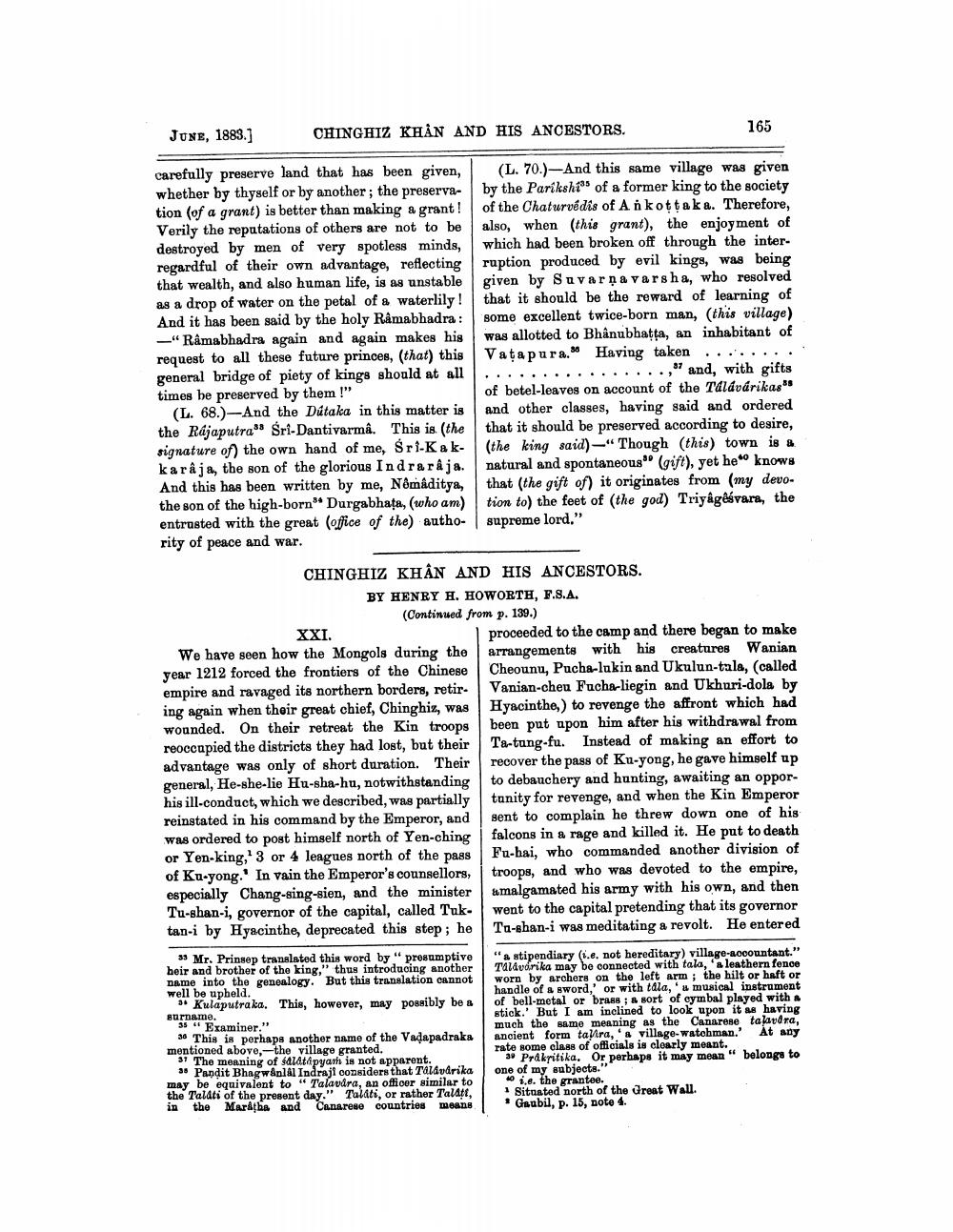________________
JUNE, 1883.]
carefully preserve land that has been given, whether by thyself or by another; the preservation (of a grant) is better than making grant! Verily the reputations of others are not to be destroyed by men of very spotless minds, regardful of their own advantage, reflecting that wealth, and also human life, is as unstable as a drop of water on the petal of a waterlily! And it has been said by the holy Râmabhadra: -"Ramabhadra again and again makes his request to all these future princes, (that) this general bridge of piety of kings should at all times be preserved by them!"
(L. 68.)-And the Dútaka in this matter is the Rajaputra Śri-Dantivarmâ. This is (the signature of) the own hand of me, Sri-Kakkaraja, the son of the glorious Indraraja. And this has been written by me, Nêmâditya, the son of the high-born" Durgabhața, (who am) entrusted with the great (office of the) authority of peace and war.
CHINGHIZ KHAN AND HIS ANCESTORS.
XXI.
We have seen how the Mongols during the year 1212 forced the frontiers of the Chinese empire and ravaged its northern borders, retiring again when their great chief, Chinghiz, was wounded. On their retreat the Kin troops reoccupied the districts they had lost, but their advantage was only of short duration. Their general, He-she-lie Hu-sha-hu, notwithstanding his ill-conduct, which we described, was partially reinstated in his command by the Emperor, and was ordered to post himself north of Yen-ching or Yen-king,' 3 or 4 leagues north of the pass of Ku-yong. In vain the Emperor's counsellors, especially Chang-sing-sien, and the minister Tu-shan-i, governor of the capital, called Tuktan-i by Hyacinthe, deprecated this step; he
surname.
33 Mr. Prinsep translated this word by " presumptive heir and brother of the king," thus introducing another name into the genealogy. But this translation cannot well be upheld.
3 Kulaputraka. This, however, may possibly be a
35 Examiner."
CHINGHIZ KHAN AND HIS ANCESTORS. BY HENRY H. HOWORTH, F.S.A. (Continued from p. 139.)
36 This is perhaps another name of the Vadapadraka mentioned above, the village granted.
37 The meaning of salatápyam is not apparent.
35 Pandit Bhagwanlal Indraji considers that Talavärika may be equivalent to Talavara, an officer similar to the Talati of the present day." Talati, or rather Talatt, in the Maratha and Canarese countries
means
165
(L. 70.)-And this same village was given by the Parikshi's of a former king to the society of the Chaturvedis of A n koṭṭaka. Therefore, also, when (this grant), the enjoyment of which had been broken off through the interruption produced by evil kings, was being given by Suvarnavarsha, who resolved that it should be the reward of learning of some excellent twice-born man, (this village) was allotted to Bhânubhaṭṭa, an inhabitant of Vatapura. Having taken
and, with gifts of betel-leaves on account of the Tálávárikas and other classes, having said and ordered that it should be preserved according to desire, (the king said)-"Though (this) town is a natural and spontaneous" (gift), yet he knows that (the gift of) it originates from (my devotion to) the feet of (the god) Triyâgêsvara, the supreme lord."
proceeded to the camp and there began to make arrangements with his creatures Wanian Cheounu, Pucha-lukin and Ukulun-tala, (called Vanian-cheu Fucha-liegin and Ukhuri-dola by Hyacinthe,) to revenge the affront which had been put upon him after his withdrawal from Ta-tung-fu. Instead of making an effort to recover the pass of Ku-yong, he gave himself up to debauchery and hunting, awaiting an opportunity for revenge, and when the Kin Emperor sent to complain he threw down one of his falcons in a rage and killed it. He put to death Fu-hai, who commanded another division of troops, and who was devoted to the empire, amalgamated his army with his own, and then went to the capital pretending that its governor Ta-shan-i was meditating a revolt. He entered
"
"a stipendiary (i.e. not hereditary) village-accountant." Talavárika may be connected with tala, a leathern fence worn by archers on the left arm; the hilt or haft or handle of a sword, or with tala, a musical instrument of bell-metal or brass; a sort of cymbal played with a stick.' But I am inclined to look upon it as having much the same meaning as the Canarese talavora, ancient form talra, a village-watchman." At any
rate some class of officials is clearly meant.
39 Prakritika. Or perhaps it may mean" belongs to one of my subjects."
40 i.e. the grantee.
Situated north of the Great Wall.
Gaubil, p. 15, note 4.




